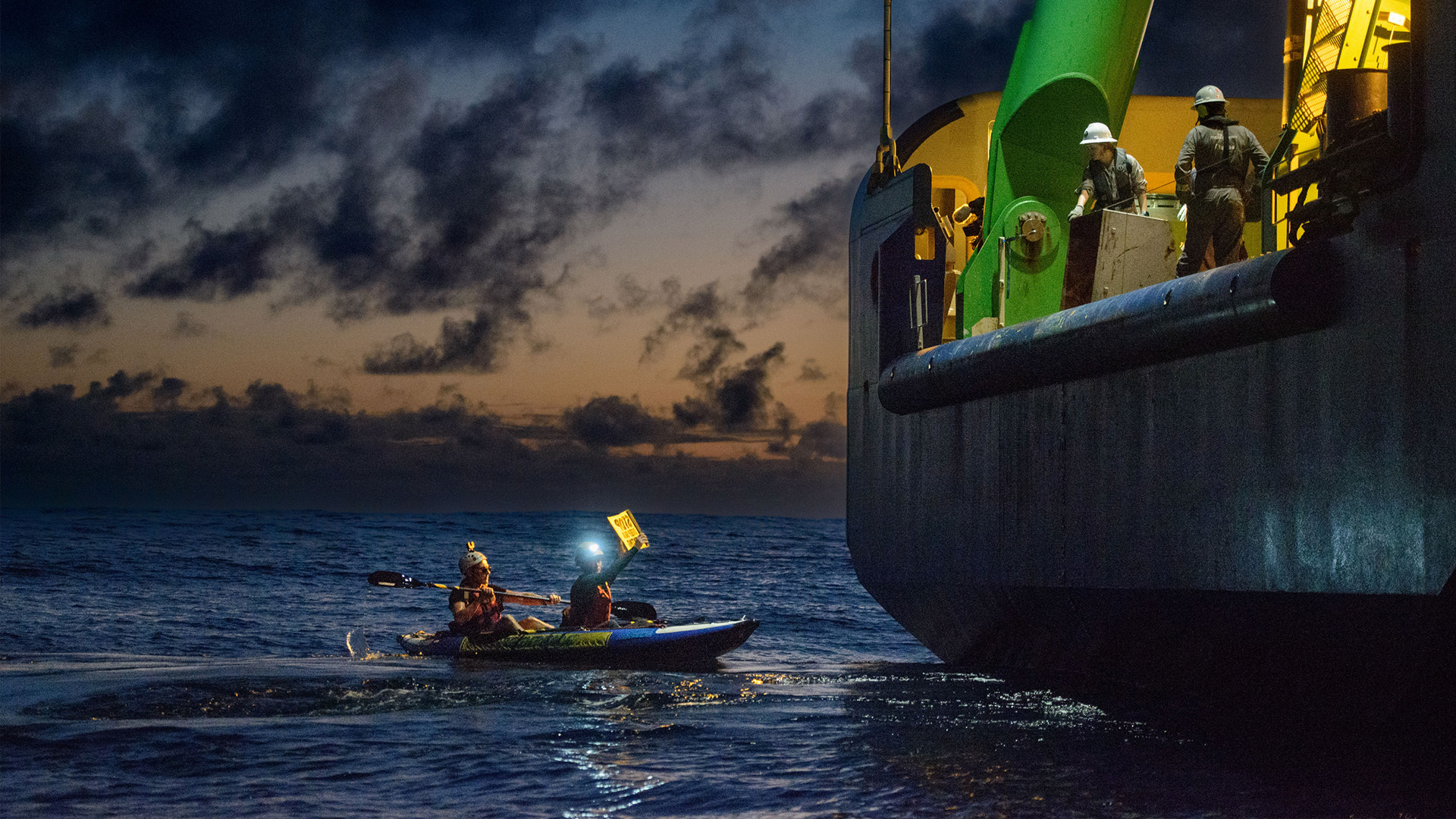
[Jack Alymer]
YOU’RE LOOKING AT A PROTEST PLAYING OUT ON THE HIGH SEAS.
THIS CONFLICT IN THE PACIFIC IS OVER THE FUTURE OF THE OCEAN FLOOR.
HERE’S WHAT’S GOING ON:
A GROUP OF GREENPEACE ACTIVISTS BOARDED THIS DEEP SEA MINING VESSEL LAST WEEK.
THE SHIP’S GOAL IS CONDUCT RESEARCH ON THE POTENTIAL EXTRACTION OF VITAL RESOURCES USED TO CREATE ELECTRIC VEHICLES.
SO, WHY ARE ENVIRONMENTALISTS PROTESTING IT?
[Greenpeace]
“We cannot transition to a green future by degrading one of the most intact ecosystems on our planet. It’s just complete greenwash, there are other solutions out there that we know exist. And that’s what we should be pursuing, not going forward with another exploitation of our planet, which we know from history leads to nature destruction, increased climate change.”
[Jack Alymer]
GREENPEACE PLACED KAYAKS BENEATH THE VESSEL – EFFECTIVELY BLOCKING RESEARCHERS FROM DEPLOYING EQUIPMENT AND THEN PROCEEDED TO BOARD THE SHIP.
THEY SAY DEEP SEA MINING EFFORTS IN THIS REGION COULD CAUSE HARM TO OVER 5-THOUSAND DIFFERENT SPECIES OF MARINE LIFE.
AND THEY SAY THEY WON’T LEAVE – UNTIL THEIR DEMANDS ARE MET.
[Greenpeace]
“We’re here to say that we want them to leave this area and stop their deep sea mining exploration. Otherwise, we’re going to stay and continue our disruption … we plan to remain here until they leave the area.”
[Jack Alymer]
THE METALS COMPANY, WHOSE SUBSIDIARY RUNS THE SHIP, WANTS TO POSITION THEMSELVES AS A THE WORLD’S LARGEST SUPPLIER OF METALLIC RESOURCES NEEDED FOR GREEN ENERGY INITIATIVES.
THEY SAY THEIR VESSEL IS CONDUCTING LEGALLY MANDATED SCIENTIFIC RESEARCH.
RESEARCH THAT AIMS TO LOCATE SMALL ROCKS ON THE SEABED KNOWN AS POLYMETALLIC NODULES.
THEY CONTAIN A VARIETY OF ELEMENTS – MANY VITAL TO THE PRODUCTION OF EMERGING TECHNOLOGIES LIKE ELECTRIC VEHICLES.
IT’S A POTENTIAL GOLD MINE – SOME ESTIMATES PUTTING THE VALUE OF THESE NODULES IN THE TRILLIONS.
[Gerard Barron]
“This is like a battery in a rock. So we have nickel, we have copper, cobalt, and manganese. And as we know, the world is moving into a more sustainable sort of mood, which means that we want to move away from fossil fuels, and we want to electrify the fleet and use renewable energy. But to do that, we’re going to need a lot of metals. So the question for society is, where are we going to get them from?”
[Jack Alymer]
THE METALS COMPANY’S CEO ESTIMATES THE AMOUNT OF NODULES FOUND IN JUST A FRACTION OF THE PACIFIC OCEAN’S SEAFLOOR COULD POWER ABOUT TWO-HUNDRED-EIGHTY-MILLION EVS.
TO PUT IT IN PERSPECTIVE – THAT’S NEARLY THE NUMBER OF *ALL CARS CURRENTLY ON THE ROAD IN THE U-S.
STUDIES HAVE FOUND EXTRACTING RESOURCES FROM THESE NODULES WOULD BE LESS HARMFUL TO THE PLANET THAN IT WOULD BE TO MINE THEM ON LAND.
[Gerard Barron]
“There’s no rain forests to destroy in our area. There’s no risk of any child labor or human rights violations. And there’s no impact on sequestered carbon … I think when we look at all of those aspects, we have to give ocean metals the chance it deserves.”
[Jack Alymer]
BUT GREENPEACE MAINTAINS THE RISK IS STILL TOO GREAT.
[GREENPEACE]
“Over 800 scientists have signed an open letter from 44 different countries around the world saying that so little is known about these areas, that we can’t just go in and start extracting and destroying an ecosystem that we know so little about.”
[Jack Alymer]
SCIENTIFIC EXPERTS CONSULTED BY GREENPEACE SAY THERE’S STILL NOT ENOUGH INFORMATION TO JUSTIFY THE SPEED IN WHICH THE METALS COMPANY IS MOVING AHEAD.
GREENPEACE TELLING STRAIGHT ARROW NEWS, “DEEP SEA MINERS HAVE NO CREDIBILITY AND ARE SHOWING THEIR TRUE COLORS, USING THE EXACT SAME TRICKS AS THE OIL INDUSTRY TO WREAK DAMAGE ON OUR PLANET WHEN IT HAS ALREADY HAD FAR TOO MUCH.”
IT’S AN ASSERTION THE METALS COMPANY HAS CHALLENGED, SAYING “GREENPEACE’S ACTIONS TO STOP THE SCIENCE SUGGEST A FEAR THAT EMERGING SCIENTIFIC FINDINGS MIGHT CHALLENGE THEIR MISLEADING NARRATIVE ABOUT THE ENVIRONMENTAL IMPACTS OF NODULE COLLECTION, AS OUR DATA HAS JUST BEGUN TO DO.”
[Gerard Barron]
“Greenpeace don’t agree with me, they would rather we not start a new extractive industry in the ocean … And ocean health is of course one of the very important issues but there are other issues that need to be taken into account. And resource is one of them. This resource is like having three tier one world class assets combined.”
[Jack Alymer]
THE COMPANY ALSO CRITICIZED GREENPEACE FOR HOW THE GROUP CHOSE TO PROTEST, ACCUSING THE ACTIVISTS OF PUTTING ALL THOSE ON BOARD THE MINING VESSEL AT RISK.
WITH THE PROTEST NOW STRETCHING INTO ITS SECOND WEEK, A LEGAL BATTLE NOW LOOMS ON THE HORIZON.
THE METALS COMPANY HAS FILED FOR AN INJUNCTION TO STOP GREENPEACE, POINTING TO INTERNATIONAL LAWS THEY SAY THE ACTIVISTS BROKE. REITERATING CLAIMS THEIR CREW WAS JEOPARDIZED BY THIS DEMONSTRATION.
[Gerard Barron]
“Our activists are extensively trained for this protest, and we absolutely wouldn’t do it. If it wasn’t safe to do so … I think what we would say is what’s really dangerous and unsafe is letting companies like the metals company destroy one of the last untouched and least known about ecosystems on our planet for profit.”
[Jack Alymer]
GREENPEACE HAS RESPONDED FURTHER BY TELLING US “THIS INDUSTRY THAT CLAIMS TO BE GREEN IS NOW THREATENING TO TAKE ENVIRONMENTAL ACTIVISTS TO COURT.
A HEARING ON THE MATTER HAS ALREADY BEEN HEARD BY A DUTCH COURT, AS BOTH SIDES ARE NOW EXPECTING A DECISION WITHIN THE COMING DAYS.







